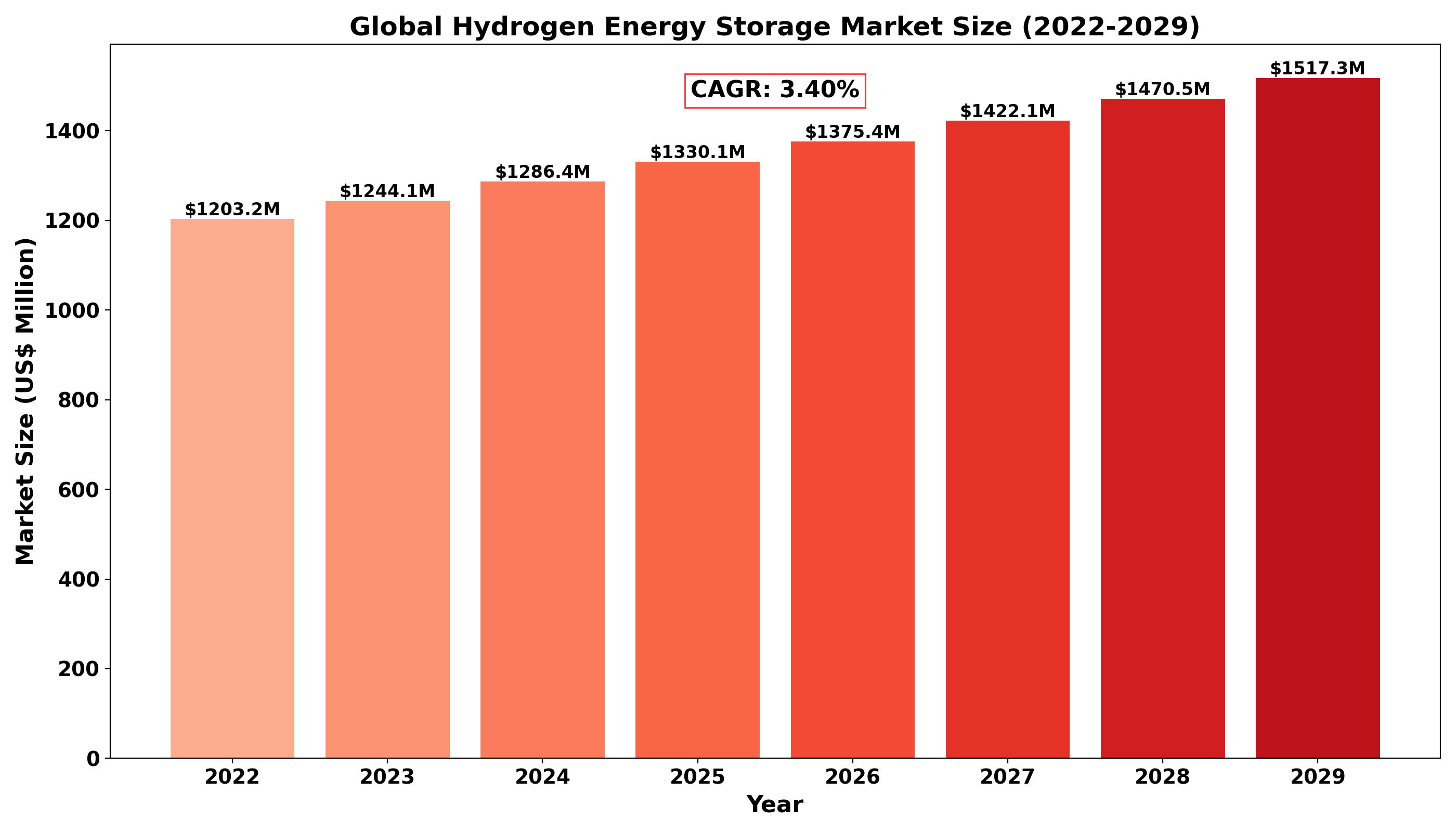Hydrogen Energy Storage Market, Global Outlook and Forecast 2023-2029
The global Hydrogen Energy Storage market was valued at US$ 1203.2 million in 2022 and is projected to reach US$ 1517.3 million by 2029, at a CAGR of 3.40% during the forecast period. The influence of COVID-19 and the Russia-Ukraine War were considered while estimating market sizes.

Hydrogen Energy Storage is a process wherein the additional of energy created by renewables during low energy demand periods is used to power electrolysis, a process in which an electrical current is passed through a chemical solution in order to divide hydrogen. Once hydrogen is created through electrolysis it can be used in stationary fuel cells, for power generation, to provide fuel for fuel cell vehicles, injected into natural gas pipelines to reduce their carbon intensity, or even stored as a compressed gas, cryogenic liquid or wide variety of loosely-bonded hydride compounds for later use.
This report aims to provide a comprehensive presentation of the global market for Hydrogen Energy Storage, with both quantitative and qualitative analysis, to help readers develop business/growth strategies, assess the market competitive situation, analyze their position in the current marketplace, and make informed business decisions regarding Hydrogen Energy Storage. This report contains market size and forecasts of Hydrogen Energy Storage in global, including the following market information:
Global Hydrogen Energy Storage Market Revenue, 2018-2023, 2024-2029, ($ millions)
Global Hydrogen Energy Storage Market Sales, 2018-2023, 2024-2029, (K Units)
Global top five Hydrogen Energy Storage companies in 2022 (%)
Iljin Hysolus and Iwatani are the top 2 companies in global hydrogen energy storage market and account for over 10% of total market share. Geographically speaking, Asia-Pacific holds about 35% of global market share, followed by North America with about 30% share. In terms of type, compressed gas segment holds an important share of about 60%. In terms of application, about 36% of the hydrogen energy storage are for chemical.
We surveyed the Hydrogen Energy Storage manufacturers, suppliers, distributors and industry experts on this industry, involving the sales, revenue, demand, price change, product type, recent development and plan, industry trends, drivers, challenges, obstacles, and potential risks.
Total Market by Segment:
Global Hydrogen Energy Storage Market, by Type, 2018-2023, 2024-2029 ($ Millions) & (K Units)
Global Hydrogen Energy Storage Market Segment Percentages, by Type, 2022 (%)
- By Storage Technology
- Material Based
- Liquefaction
- Compression
By Storage Type
- Stationary Storage
- Physical Storage
- Chemical Storage
By State
Global Hydrogen Energy Storage Market, by Application, 2018-2023, 2024-2029 ($ Millions) & (K Units)
Global Hydrogen Energy Storage Market Segment Percentages, by Application, 2022 (%)
- Residential
- Industrial
- Commercial
- Public Utility
- Others
Global Hydrogen Energy Storage Market, By Region and Country, 2018-2023, 2024-2029 ($ Millions) & (K Units)
Global Hydrogen Energy Storage Market Segment Percentages, By Region and Country, 2022 (%)
- North America
- US
- Canada
- Mexico
- Europe
- Germany
- France
- U.K.
- Italy
- Russia
- Nordic Countries
- Benelux
- Rest of Europe
- Asia
- China
- Japan
- South Korea
- Southeast Asia
- India
- Rest of Asia
- South America
- Brazil
- Argentina
- Rest of South America
- Middle East & Africa
- Turkey
- Israel
- Saudi Arabia
- UAE
- Rest of Middle East & Africa
Competitor Analysis
The report also provides analysis of leading market participants including:
- Key companies Hydrogen Energy Storage revenues in global market, 2018-2023 (Estimated), ($ millions)
- Key companies Hydrogen Energy Storage revenues share in global market, 2022 (%)
- Key companies Hydrogen Energy Storage sales in global market, 2018-2023 (Estimated), (K Units)
- Key companies Hydrogen Energy Storage sales share in global market, 2022 (%)
Further, the report presents profiles of competitors in the market, key players include:
- Linde
- Air Liquide
- Air Products and Chemicals
- Hydrogenics
- Chart Industries
- Hexagon Composites
- FuelCell Energy
- Nel Hydrogen
- Pragma Industries
- Mcphy Energy
- Hydrogenious Lohc Technologies
- Grz Technologies
- Plug Power
- Inoxcva
- H Bank Technology Inc
- VRV
Outline of Major Chapters:
Chapter 1: Introduces the definition of Hydrogen Energy Storage, market overview.
Chapter 2: Global Hydrogen Energy Storage market size in revenue and volume.
Chapter 3: Detailed analysis of Hydrogen Energy Storage manufacturers competitive landscape, price, sales and revenue market share, latest development plan, merger, and acquisition information, etc.
Chapter 4: Provides the analysis of various market segments by type, covering the market size and development potential of each market segment, to help readers find the blue ocean market in different market segments.
Chapter 5: Provides the analysis of various market segments by application, covering the market size and development potential of each market segment, to help readers find the blue ocean market in different downstream markets.
Chapter 6: Sales of Hydrogen Energy Storage in regional level and country level. It provides a quantitative analysis of the market size and development potential of each region and its main countries and introduces the market development, future development prospects, market space of each country in the world.
Chapter 7: Provides profiles of key players, introducing the basic situation of the main companies in the market in detail, including product sales, revenue, price, gross margin, product introduction, recent development, etc.
Chapter 8: Global Hydrogen Energy Storage capacity by region & country.
Chapter 9: Introduces the market dynamics, latest developments of the market, the driving factors and restrictive factors of the market, the challenges and risks faced by manufacturers in the industry, and the analysis of relevant policies in the industry.
Chapter 10: Analysis of industrial chain, including the upstream and downstream of the industry.
Chapter 11: The main points and conclusions of the report.
